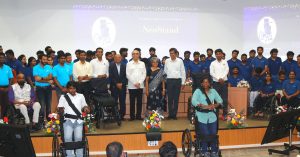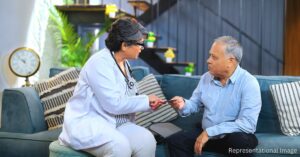Battling OCD Herself, 16-YO Bengaluru Teen Creates App to Help Others Like Her Cope
While working on the app, Kaajal Gupta felt responsible for making the app not only for herself but also for every single person who was struggling with OCD.

Obsessive Compulsive Disorder, or OCD, is one of the most misunderstood mental disorders in India. To think about it, how many times have we cracked crass jokes about our friends of having OCD, because they were a bit more organised than us or exhibited specific behavioural patterns?
The truth is OCD is a way more complicated mental disorder than most of us like to believe. For me, the eye-opening moment happened when I came across a documentary about what it means to live with the chronic disorder.
I understood that besides making a person have uncontrollable, recurring thoughts, sensations (obsessions) and repetitive behaviours (compulsions), the disorder further propels one to repeat a particular activity over and over which can cause them a significant amount of embarrassment and distress.
Sadly, many of us have no idea about the disorder which is frequently stereotyped, and I feel that, in a bid to raise awareness about OCD, the first step from our end should be to stop trivialising the disorder or self-diagnosing someone with it based on limited knowledge.
With May being observed as the month for Mental Health Awareness, we would like to draw your attention to a mobile application, Liberate: My OCD Fighter. Developed by a 16-year-old, this is perhaps the first and only app in the country that provides an online self-help diary to people with OCD.
Clinically diagnosed with OCD herself, Bengaluru-based Kaajal Gupta had spent many of her teenage years struggling with her compulsions.

Speaking with The Better India, she shares how she came to develop the app.
“I’ve been living with OCD since 8th grade. At that time, to help me fight with my overpowering compulsions, my therapist had suggested maintaining a diary where I could record these as well as any negative thoughts that would pop up. However, I couldn’t get myself to do it as I was too absorbed in my compulsions. Also, the crippling anxiety over someone coming across what I’d written stopped me from doing so,” remembers Kaajal.
Admitting that the practice would have helped her to understand and analyse her obsessive thoughts and urges back then, Kaajal decided to do something to track one’s compulsions without requiring to write it down physically.
“I understood that there might be so many others, who might also find it impossible to write things down. Also, not everyone carries their diary all the time. So by the time one gets back to log that day’s compulsions, the moment might have already passed. However, people have their phones with them all the time, and I wondered if the same exercise could be developed into a mobile application,” says the grade eleven student.
Being quite passionate about coding and Android development, Kaajal decided to create a mobile application that would rule out the diary-writing issue, while providing a secure space for people with OCD for entering their thoughts and tracking obsessive actions.
“With all the inputs being recorded timely, it would give one the ease of detecting trends, patterns and triggers through gentle reminders from the self-help app. One can log these details as and when a compulsion or trigger strikes,” Kaajal explains.
Liberate includes the following features:

- Scheduling your Worry Time – You can schedule specific periods of worry, which will, in the long run, reduce the time spent performing compulsions.
- Controlling your Compulsions – You can also manipulate compulsions, including changing them (their frequency and order), postponing them (offering mild resistance), shortening/retarding them (effectively minimising their effect on your life).
- Creating a Fear Ladder – The app also allows you to create their Fear Ladder of triggers for each of your compulsions, and perform exposure exercises to normalise these triggers. You can perform CBT exercises on the app, which help analyse your thought processes.
- Setting Goals for yourself – All these exercises can be planned using our goal-setting feature. Using this, you can set short-term, medium-term and long-term goals, thus motivating yourself to fight your anxiety.
- Connecting with your therapist through regular reports – The app sends weekly progress reports to your therapist with data it automatically collects through your exercises. These reports include data regarding the effect of your compulsions on your emotions, the number of OCD attacks you suffered over the week (also relating your compulsions to the time of day), and various triggers and calming factors specific to each compulsion.
- Getting external support – You will also be able to designate support members whom you trust, who will be notified when you suffer an attack or have multiple compulsions and other situations where outside help is critical. This ensures that you are not alone in your journey to conquer your OCD.
Starting with the backend work at the beginning of 2018, Kaajal figured that she needed professional guidance from someone in the field especially regarding text resources and exercises of the app. In this pursuit, she was assisted by Dr Paulomi M. Sudhir, a Professor at NIMHANS.
“Kaajal had requested my inputs for reviewing the content of the app, which she had already put in with the help of literature review and similar programs. My role was to look at the therapeutic aspects of the content and accuracy of information about therapies, and psychological explanations of OCD, as a clinician who works with clients with OCD,” Dr Paulomi explains.
While working on the app, Kaajal felt responsible for making the app for herself and for every single person who was living and struggling with OCD.
“When I talk of compulsions, it could be something as insignificant as opening a tap. The fact that I’d have to do it over and over till the compulsion dies down is something often inexplicable and even humiliating. Not everyone is lucky to have an open-minded family or resources to visit a therapist, and I wanted this app to bridge those barriers,” says Kaajal, the driven coding enthusiast.
Also helping Kaajal on the front-end of the app were a group of illustrators and a web designer. Her idea was to keep the app as visually attractive as possible with vibrant colour schemes and appealing illustrations.
With coding, relevant research and the pertinent debugging in place along with testing done with two volunteers with OCD, Kaajal was ready with her app in November last year.

After its launch on Play Store, Liberate has been downloaded over 1,000 times by users in India and the US, where the app is currently available. The app for the iOS platform is underway too.
We spoke to Durga Nittur, a prolific golfer based in Bengaluru, who has been using the app since its launch.
“I refused to accept the fact that I had OCD. But after I accepted that I had it, it became more difficult to cope with it. Being a golfer, I used to get compulsive and feel the world was going to end in the middle of my tournaments. But with this app, I’m aware of my compulsions and triggers. It tracks the number of times when I’ve felt compulsive. The best part of this app is the “panic” button. Every time I have a panic attack, help is one button away,” she says.
“The panic call doesn’t have to go to your parents or family, I can also contact a psychologist whom I don’t even know, and I feel safe because of this. This has saved me from doing some foolish things. This app has helped me become a better golfer as well. Having OCD is nothing to be ashamed of and dealing with this can be a real pain and struggle, but it does get so much easier with this app! I would recommend it to everyone who suffers from this,” she shares.
Currently, Kaajal is looking forward to testing the clinical application and feasibility of
using the app on clients, through a systematic study. For this, a research proposal has been
submitted, with clinicians working in the area of OCD and cognitive behaviour therapy (CBT) at NIMHANS.
As to how it will help those with OCD, Dr Paulomi shares that initiatives such as the Liberate app, would be constructive in reducing stigma regarding mental illnesses such as OCD.
“It would also help provide the first level of mental health intervention: in the form of education about the condition, assessment of its severity and also for those with milder severity, it is likely to provide an opportunity to work on their symptoms systematically. We are yet to test the feasibility, acceptability and effectiveness of the app through a clinical trial with appropriate and scientific methodology. We are awaiting a review of the proposal and will begin the study after obtaining approvals,” she says.
You may also like: Mental Health 101: India’s First Science-Backed Therapy Course is Now Online!
Dr Paulomi further adds that there are several apps (both guided and unguided) available for various mental health conditions globally, including OCD.
“Most literature indicates that such applications would benefit persons who have mild to moderate severity of illness with a good understanding of their illness (insight) and not having any significant comorbid mental health conditions—in particular, severe depression or severe personality disorders, psychotic symptoms—all of which would need intense, face to face interventions. Therefore, regular screening and checks within such programs are recommended to address red flags such as worsening of mood, feelings of hopelessness and so on, as a therapist would otherwise assess these in a face to face intervention,” she concludes.
Kaajal’s struggle with OCD is indeed incredible and more admirable is how her struggles laid the foundation for the 16-year-old to develop a self-help tool that is helping hundreds cope with their OCD.
We hope Liberate gets approved for a clinical trial at NIMHANS and finds more users in the future.
You can download the app from the Play Store here.
(Edited by Saiqua Sultan)
Like this story? Or have something to share?
Write to us: [email protected]
Connect with us on Facebook and Twitter
This story made me
- 97
- 121
- 89
- 167
Tell Us More
We bring stories straight from the heart of India, to inspire millions and create a wave of impact. Our positive movement is growing bigger everyday, and we would love for you to join it.
Please contribute whatever you can, every little penny helps our team in bringing you more stories that support dreams and spread hope.



















